Three days and three nights staying in the luxurious Clubhouse at Fritton Lake in Norfolk was enough to reset mind, body and spirit and satisfy a deep yearning for connection with nature
Three days and three nights staying in the luxurious Clubhouse at Fritton Lake in Norfolk was enough to reset mind, body and spirit and satisfy a deep yearning for connection with nature
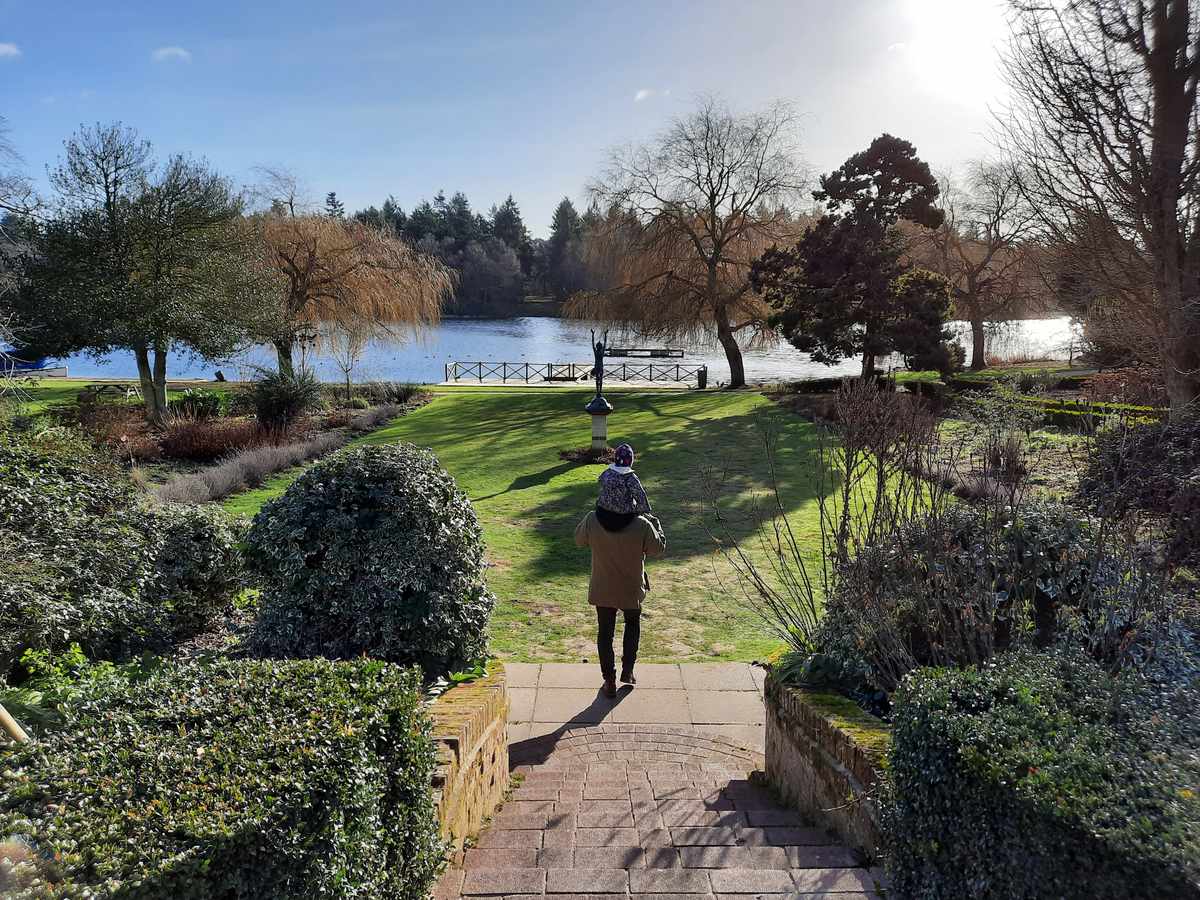
This article was first published on - www.itmustbenow.com_
We stayed at the Fritton Lake holiday resort in the depths of winter, the quiet period in January when our hopes for the future seem peculiarly dependent on seeing a snowdrop… or any sign of new life! If there was a risk of a seasonal slump in mood - this utterly unique destination was just the remedy we sought.
We were lucky with the weather, it was bright and clear, but the key factor in the success of our trip was finding somewhere excitingly off-the-radar, with a great list of fun things to do, surrounded by resplendent nature (nestled in a pioneering thousand-acre rewilding project) whilst also offering supreme comfort and great food all for very reasonable prices.
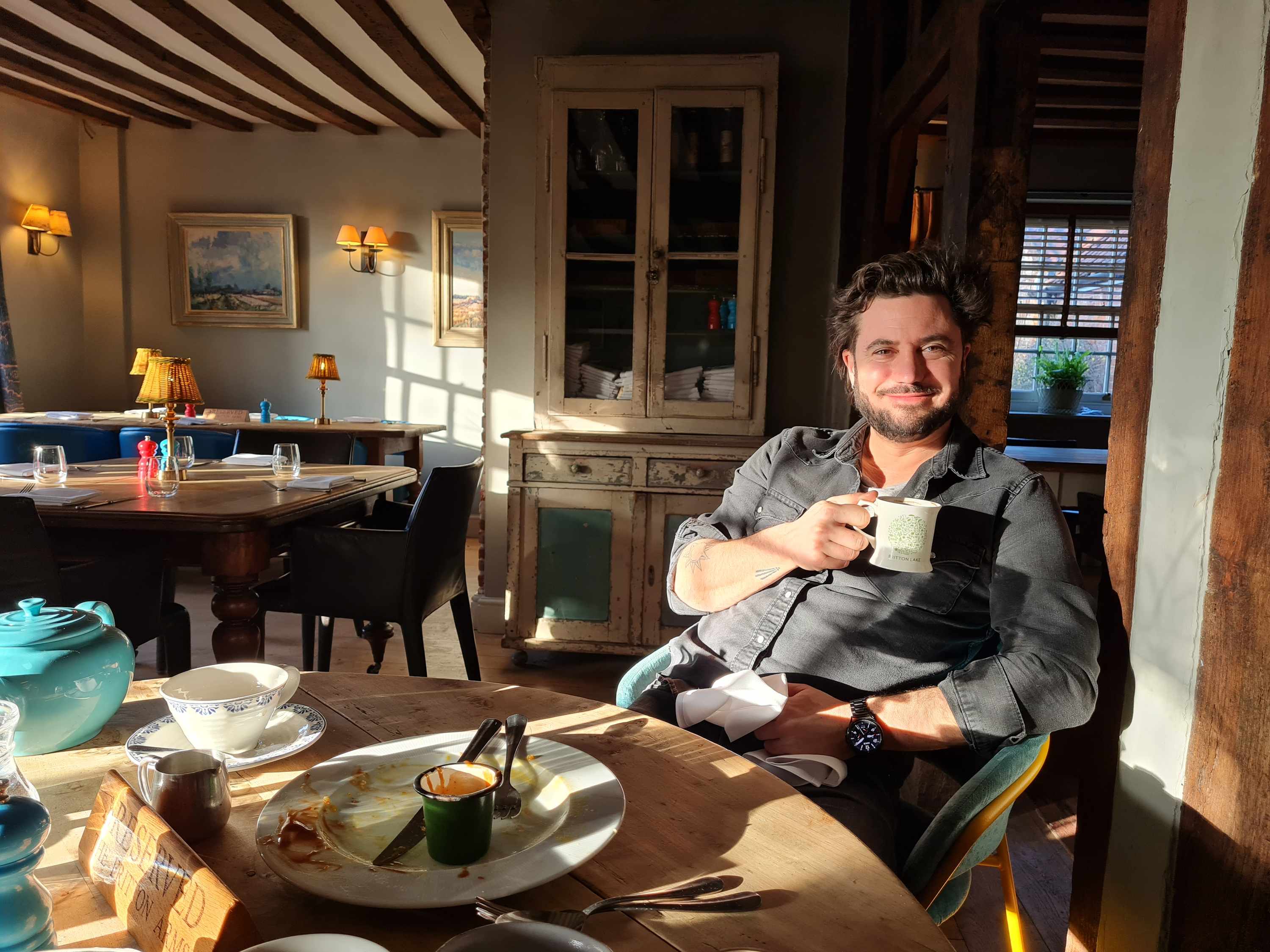
Matt having a morning coffee in the clubhouse
The Clubhouse and grounds
The history of the area is fascinating. Fritton Lake is manmade, largely dug in medieval times to extract peat for burning. There was a secret training facility on the site during World War 2 for amphibious tanks and this is also where the hovercraft was invented. Now, the area is splendidly given back to nature and noisy business on the water is almost exclusively down to the abundant water fowl.
If you arrive for a short stay, like we did, you have to be buzzed in on the outer estate perimeter because Fritton Lake is also a members club. There are an assortment of holiday cabins that can be rented or bought on site offering access to all the amenities. The perimeter fence is exciting because it marks the edge of one of the UK’s boldest new rewilding initiatives. What wild beasties would we see during our stay? We were buzzed in, crossed the cattle grate and made our way up a long drive heading into the attractively sculpted grounds.
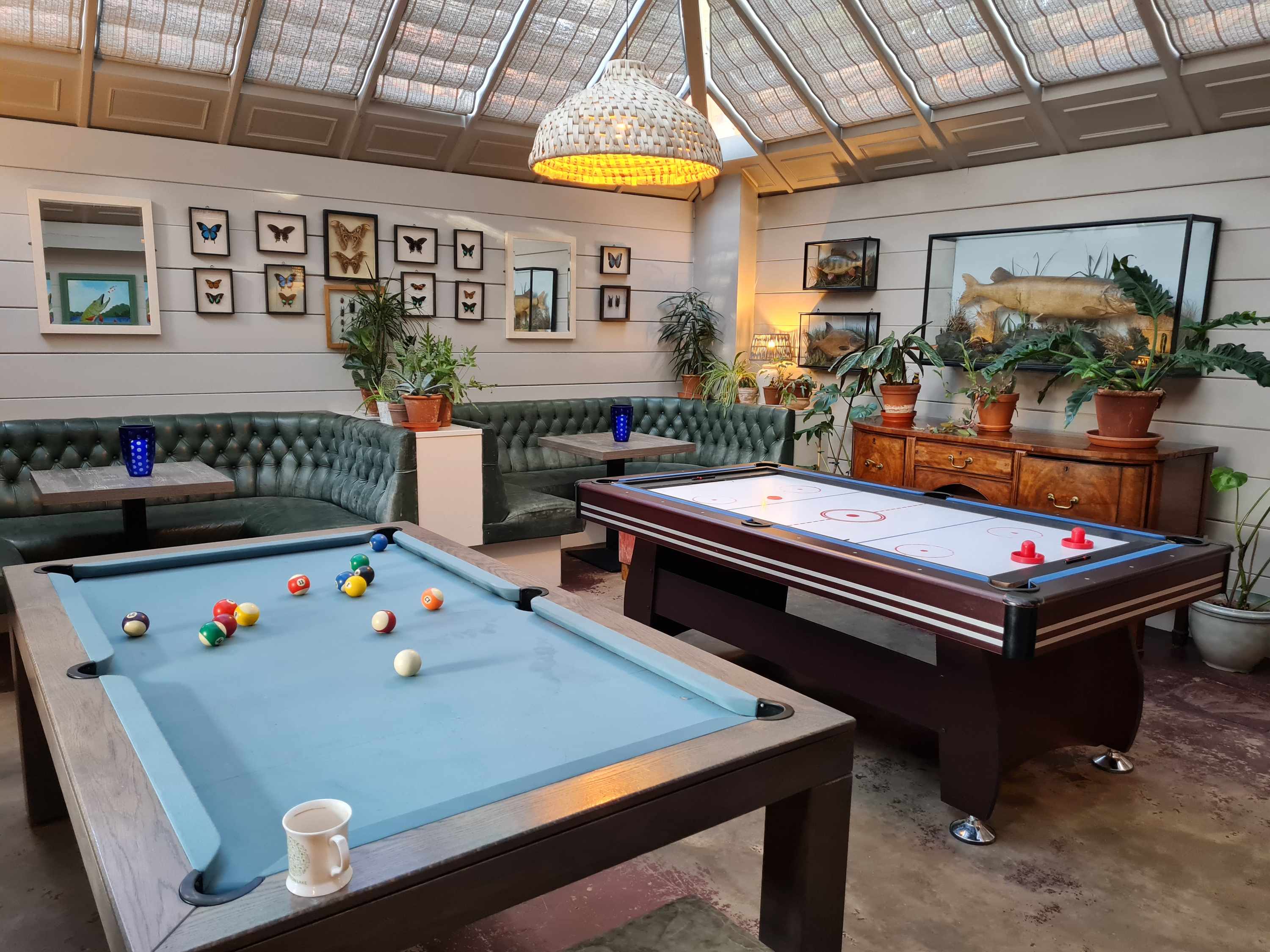
The games room
The charming 16th century clubhouse used to be a pub which has a vibrant history of its own and the whole operation is owned by the Somerleyton Estate which is just up the road. As I walked into the cozy interior I was immediately warmed by the open fires happily roaring in every room and the wonderfully friendly welcome. The staff were a happy, relaxed and convivial bunch who made us feel like we were at a home-away-from-home for our whole visit.
I was surprised and impressed to see Hugh Crossley, The Lord Somerleyton, entertaining friends and family at a long table in the restaurant area. I thought to myself this bodes extremely well for the quality of the food if this is where the 4th Baron Somerleyton takes his Sunday roast! We were not disappointed. The food was excellent and it was a treat to eat locally culled venison which is perhaps the most environmentally friendly meat to eat.
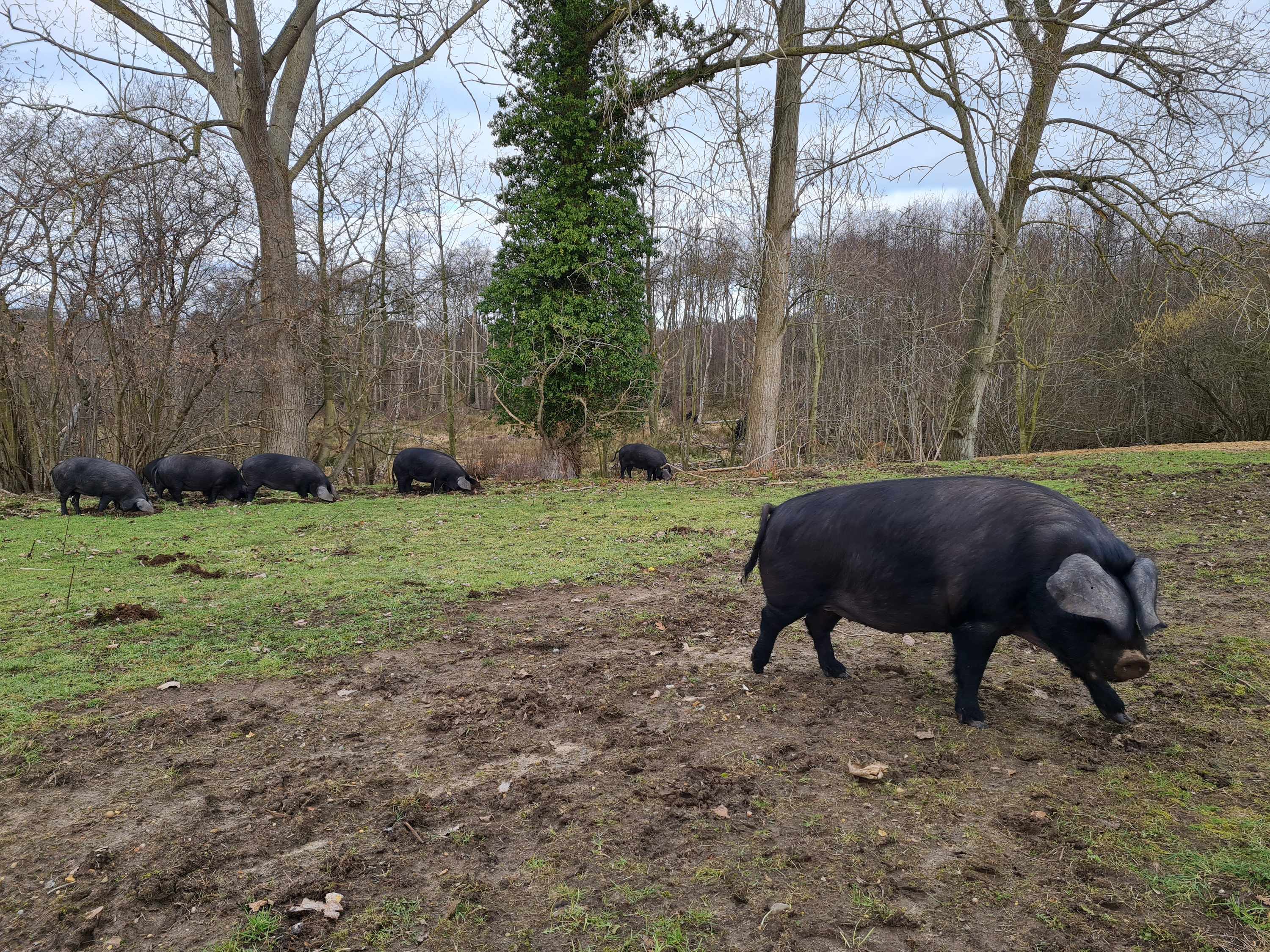
An all female group of Large Black pigs
The Safari
There is a seemingly endless list of activities on offer at Fritton Lake including boating, swimming, tennis, cycling, a well equipped games room and more. However, for a nature-lover like me, top of the list of things to do was the safari.
The next day - Matthew - our knowledgeable and splendidly enthusiastic guide picked us up. It wasn’t long before we had plunged into the dark mysteries of the woods that surround the lake. As our WW2 all terrain vehicle bounced and careened around a corner over an uneven track we gasped in wonder as we came within sight of a herd of serene and stunning red deer. They were rustling in the undergrowth about twenty meters from us, nervous but not scared. We sat in hushed silence enjoying watching these large, graceful animals basking in the mottled morning light.
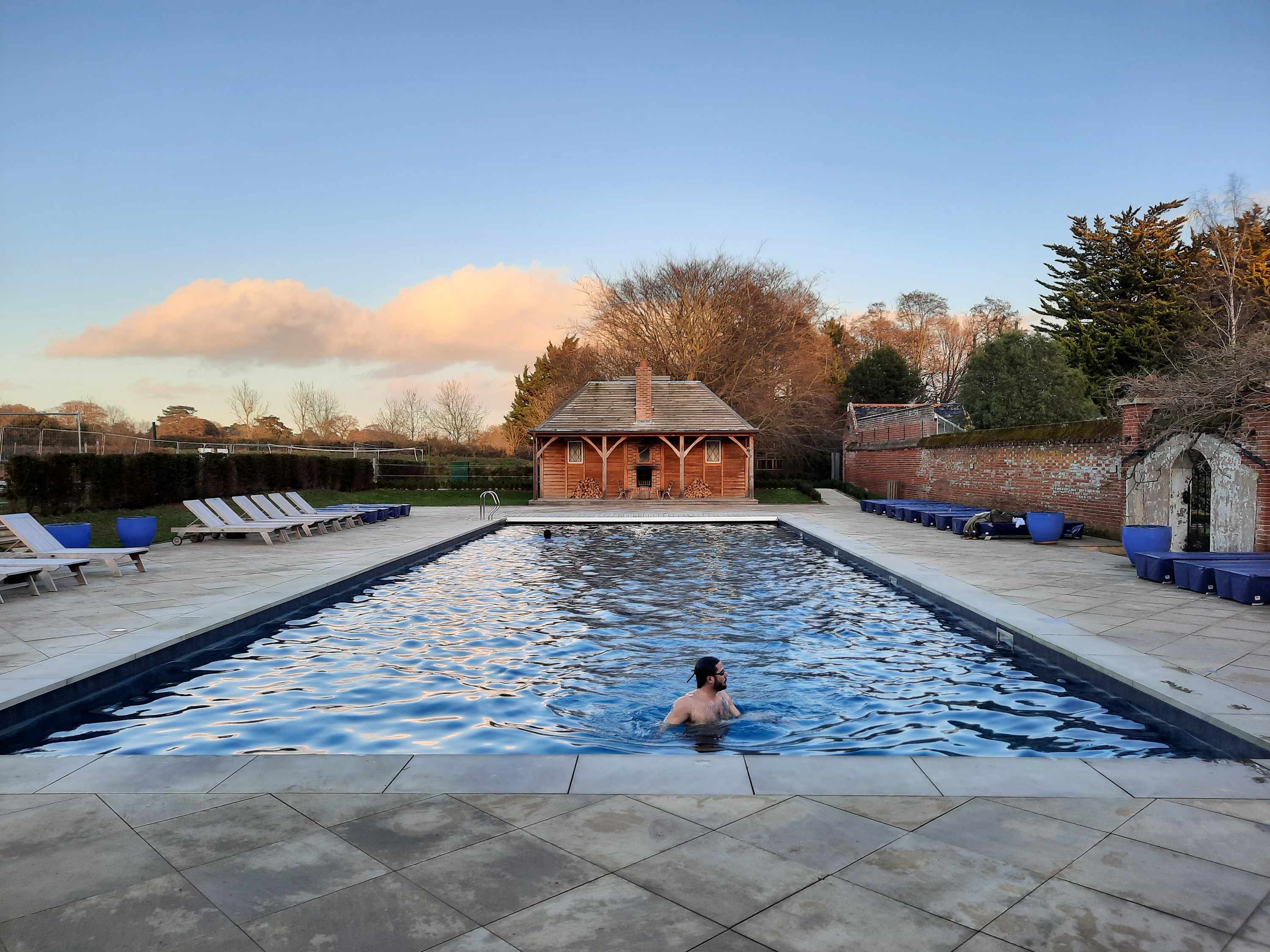
The pool at Fritton Lake is awesome
Further on, we came across pigs. Not the tragic traumatized version you find in factory farms but the real deal. A strong, curious, intelligent breed exploring and rootling between the trees. This was an all female group of Large Black pigs. The matriarch off slightly to one side. The younger females closer together. All of them were animated and busy enjoying life under the canopy.
We also saw enormous bison, highland cattle and an immense array of exciting bird species including white stalks and red kites. Apparently nightingales are also returning. We returned to the lodge feeling like intrepid explorers ready for a frothy pint of ale and inspired wildlife chat imagining what the composition of the woods might be like in 50 years if the regeneration continues.
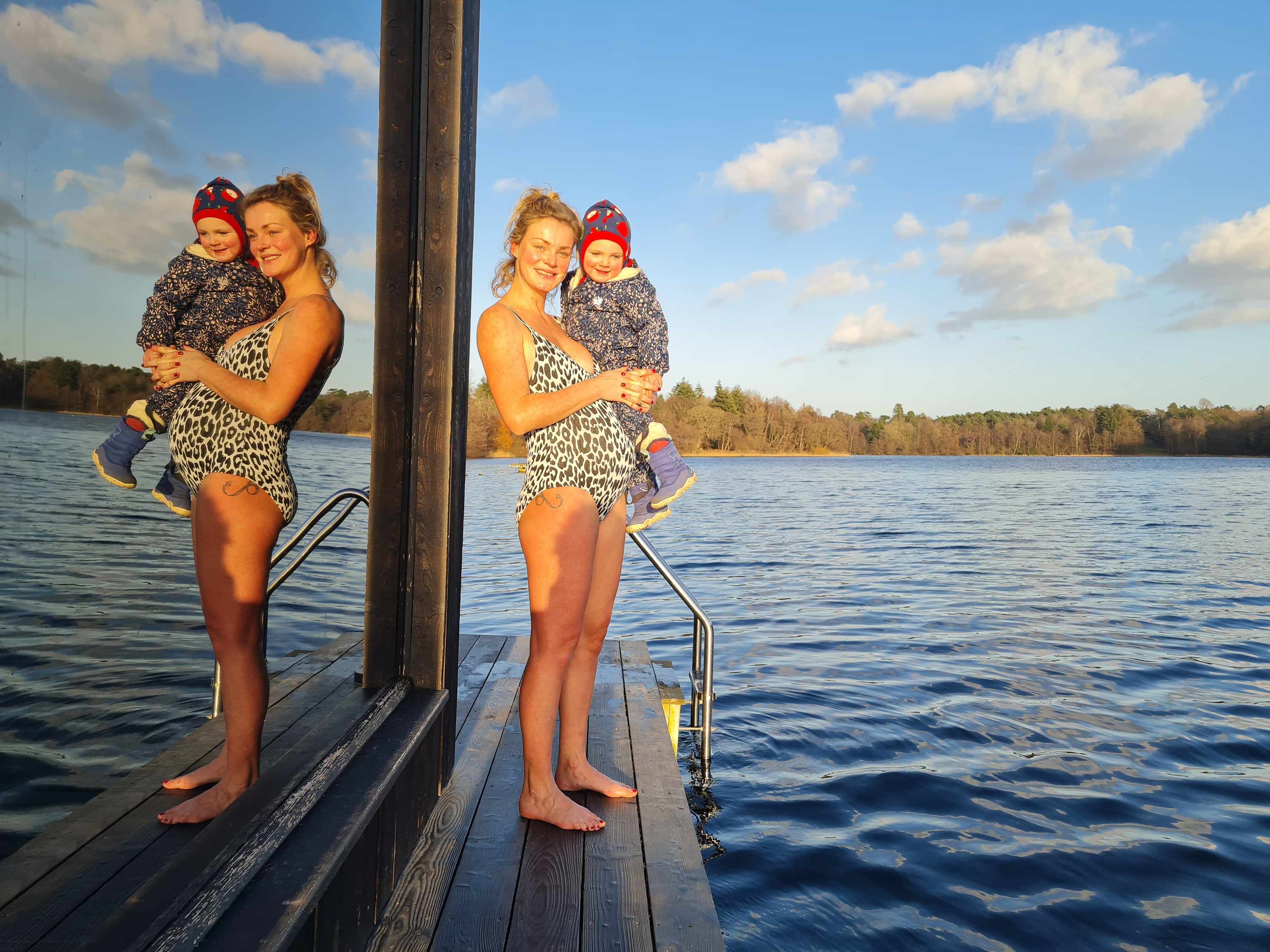
Nicola and Oona on the floating sauna
The floating sauna
I rested back against the warm timber, breathed deeply and soaked up the extraordinary panoramic view of the lake and woods through the completely glass side. The sun was setting and a flight of ducks circled looking for a place to land. It never struck me that a sauna would be more enjoyable floating on water but without doubt it is so. I felt supremely content.
As I savoured this special moment, I allowed myself to think about all I had learned over my stay. Rewilding is a controversial term that has earned some enemies but I was struck that done in the right way, with skill and intelligence, it isn’t just about restoring nature. It is also about helping humans restore themselves.
I stepped out of the sauna and slid down into the frigid water. It was deliciously exhilarating. With my eyes at water level, looking out at the sun sinking through the trees I felt like a wild animal myself. I was some kind of dangerous, lurking swamp creature. The cold started creeping into my bones and I uttered a low sonorous growl.
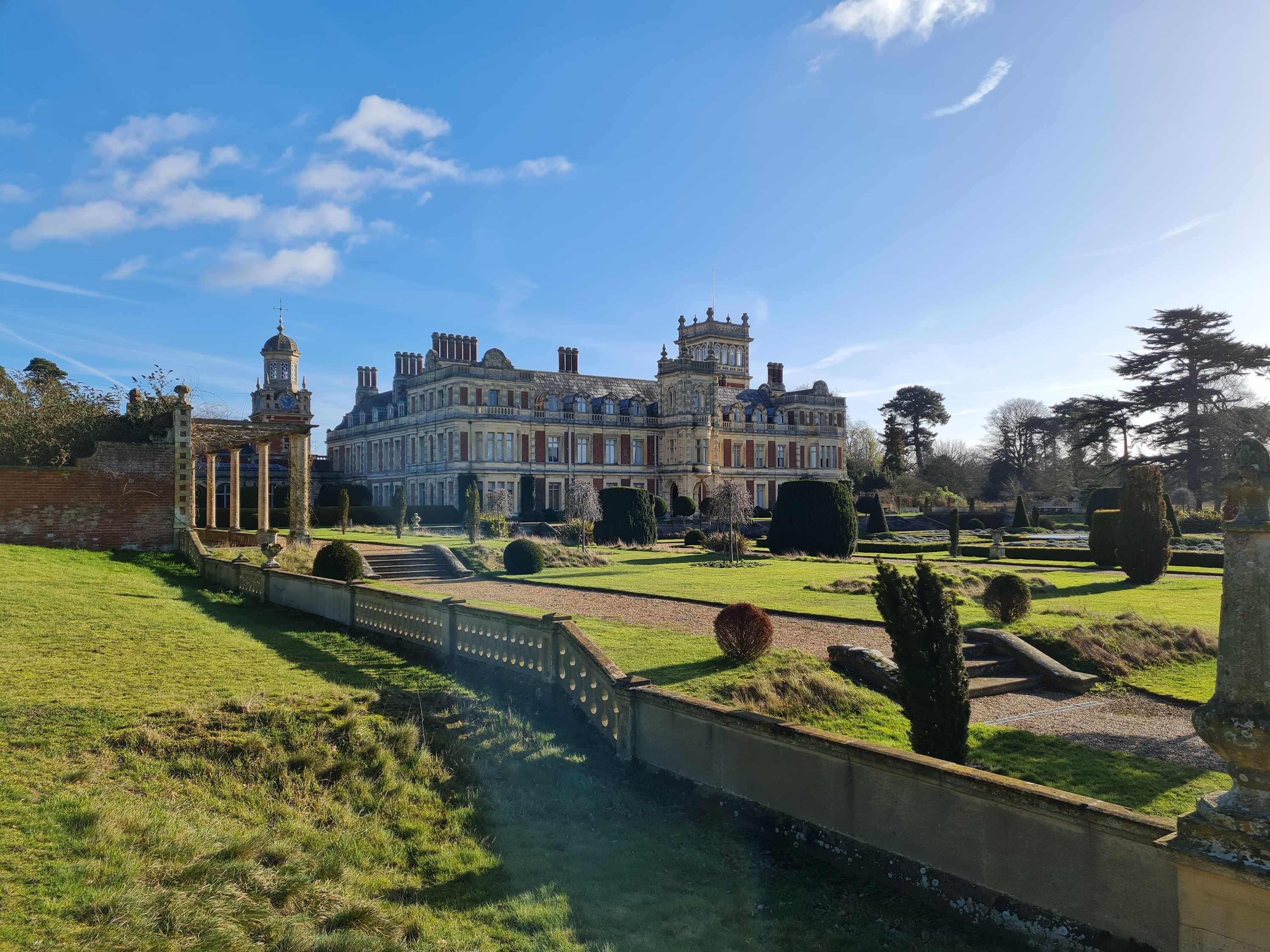
Lord Crossley's home - Somerleyton Hall - is well worth a visit
Wild East
The next day I had a meeting with Hugh Crossley and his farm manager Rob Raven. They were very generous with their time and their knowledge and filled me in on the history of rewilding on the site and where it is going. Fascinatingly, with great skill the team have managed to maintain a productive farm on the estate alongside the restored ecosystems.
I was interested in whether species were actively reintroduced or if they came back naturally.
Rob said - “The whole project really is about habitat creation… really you have to build the environment and the animals move in.”
Individual projects are great but there is only so much anyone can do in any one location. To effectively bring back lost species we need a whole nationwide mosaic of thriving wild places all connected with wildlife corridors which enable large animals to move from place to place. To this end, Hugh is a founding director of WildEast, an ambitious plan to return 250,000 hectares of land to nature as they put it - “creating a wetter, wilder, woodier future.” Hugh said “We need to be thinking at scale and connecting at scale.”
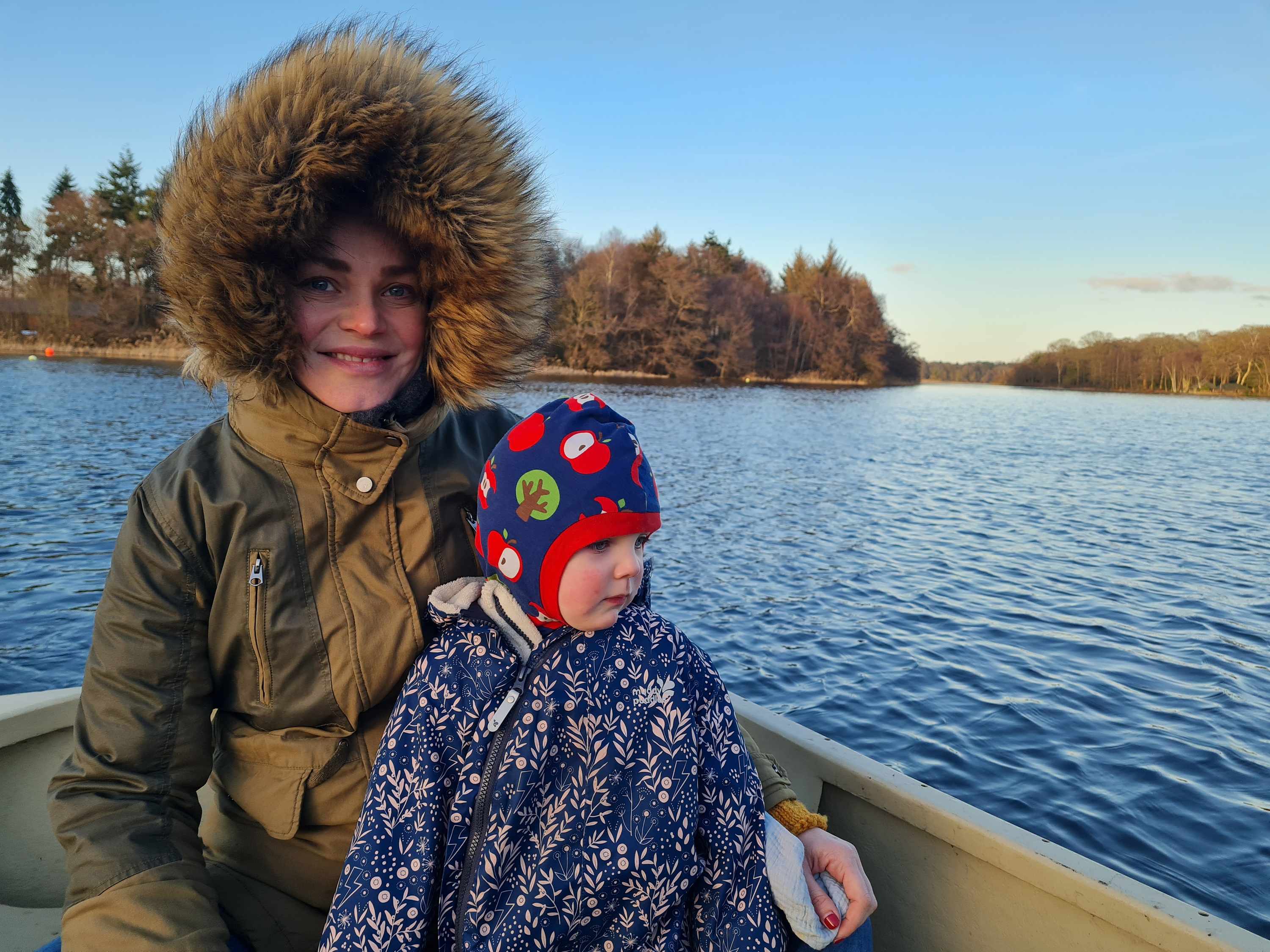
Boating on the beautiful lake
Currently the UK has an extreme lack of wild predators. This means there is an overabundance of herbivores such as deer which then feast on saplings preventing the natural regeneration of woodland. I had spotted that the logo for WildEast is a lynx and I was curious to know if the team here had plans to bring back this iconic wild cat. Hugh answered - “It is going to take time as mindsets change and those connections come back and those species come back… we would like to leave behind a landscape that could host lynx.” Although a little disappointed it wouldn’t happen soon. I was very impressed by the long term thinking!
Debates rage about rewilding interfering with the rather vital business of feeding our nation and yet without fanfare or hubris certain special places are quietly getting on with new land management techniques that do both. Fritton Lake is at the vanguard. Come and see for yourself and you will find farming, rewilding and hospitality co-existing in a virtuous triumvirate in which all benefit from the others.
The next day, as I bobbed in a dingy on the lake, with the sun setting through the trees, watching an enormous, yet graceful white crane loop down into the bracken, a very pleasing thought bubbled up. Letting our countryside return a little to nature, allowing habitat to regrow and lost species to come back is the great opportunity of our times. Staying at this shining example I saw the light. A wilder future is not just possible it is highly desirable and indeed creates opportunities for everyone.
Find our more at - www.frittonlake.co.uk
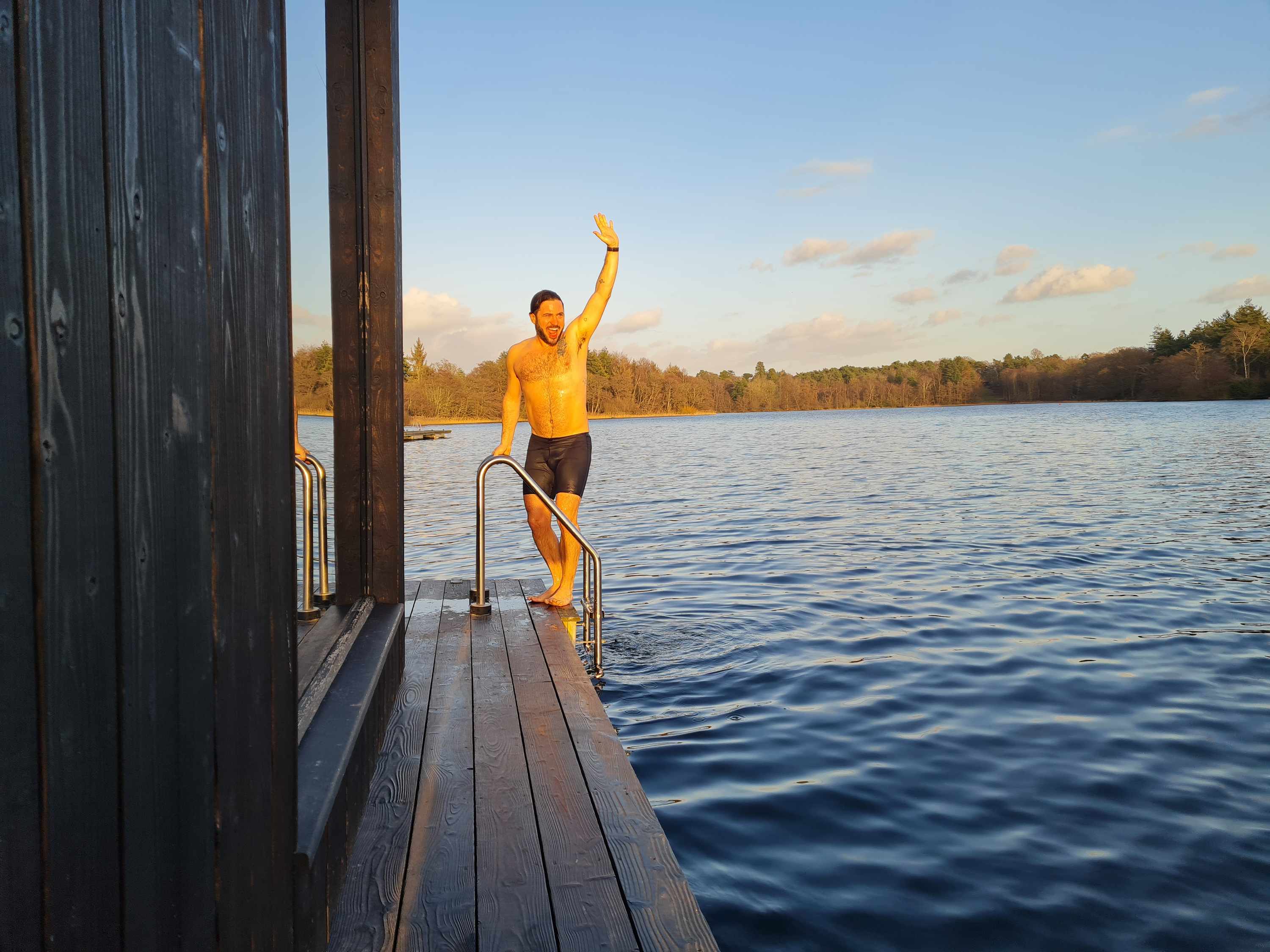
Yes yes... Matt did get in...


